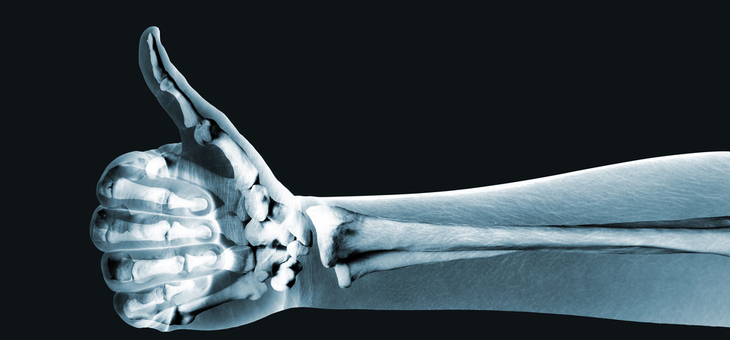Genes play a big role in our maximum bone size and strength, but lifestyle factors – such as diet and exercise – can influence whether we reach our full bone mass potential and how long we keep it.
To keep bones strong, the body breaks down old bone and replaces it with new bone tissue. A person typically reaches their peak bone mass in their late 20s, which means they will no longer increase their bone density.
Read more: How healthy are you bones?
The best time to build bone density is during years of rapid growth. Childhood, adolescence, and early adulthood are the times when we can significantly increase our peak bone mass. Not surprisingly, we can also make choices that decrease peak bone mass, such as smoking, poor nutrition, inactivity and excessive alcohol intake.
Usually, once a person reaches their 40s or 50s, they start to slowly lose bone mass. This is when the aim changes from increasing bone density to maintaining it.
How to maintain bone density
Perform strength training and weight-bearing exercises
Engaging in specific types of exercise can help you build and maintain strong bones.
One of the best types of activity for bone health is weight-bearing or high-impact exercise, which promotes the formation of new bone.
Unsure what weight-bearing exercise means? Not to be confused with weightlifting, it’s basically any exercise where you’re working against gravity – so things such as walking, dancing, jogging, rather than things such as swimming and cycling, where you have the water or a bike supporting your weight.
Eat your vegies
Eating more vegetables can benefit most people. In children, vegetables help promote bone growth; in adults, they help maintain bone density and strength.
In one study, postmenopausal participants who ate nine servings of cabbage, broccoli and other vegetables and herbs for three months saw reduced bone turnover and calcium loss. The researchers attributed the results to the boost in polyphenols and potassium that the vegetables provided.
Another study of women over 50 found those who consumed onions more frequently had a 20 per cent lower risk of osteoporosis, compared to women who rarely ate them.
Consume enough protein
About 50 per cent of bone is made of protein so it’s important to get enough in your diet.
Researchers have reported that low protein intake decreases calcium absorption and may also affect rates of bone formation and breakdown.
There have been concerns raised that high-protein diets leach calcium from bones to counteract increased acidity in the blood. However, studies have found this doesn’t occur when people consume up to 100g of protein daily alongside a balanced, varied diet.
Eat high calcium foods
Calcium is the most important mineral for bone health.
The RDI for calcium is 1000mg per day for most people, although teenagers need 1300mg and older women require 1200mg.
The amount of calcium your body actually absorbs can vary greatly and it should be spread out throughout the day.
If you eat more than 500mg of calcium at once, your body will absorb much less of it than if you consume a lower amount.
Foods rich in calcium include:
- milk
- cheese
- yoghurt
- some leafy greens, such as kale
- beans
- sardines.
Get enough vitamin D and K
Vitamin D helps your body absorb calcium and keep bones strong, but deficiency is very common.
Read more: Why vitamin D is vital for bones
You may be able to get enough vitamin D through sun exposure and food sources such as fatty fish, liver and cheese. However, many people need to supplement with up to 2000 IU of vitamin D daily to maintain optimal levels.
Vitamin K2 supports bone health by modifying osteocalcin, a protein involved in bone formation. This modification enables osteocalcin to bind to minerals in bones and helps prevent the loss of calcium from bones.
Consider supplementing with collagen
Collagen research is still in its early days but there is some evidence that it helps protect bone health.
Collagen is the main protein found in bones. It contains the amino acids glycine, proline and lysine, which help build bone, muscle, ligaments and other tissues.
Although most studies have looked at collagen’s effects on joint conditions like arthritis, it appears to have beneficial effects on bone health as well.
Maintain a healthy weight
People who are underweight have a higher risk of developing osteopenia and osteoporosis. In fact, low body weight is the main factor contributing to reduced bone density and bone loss in postmenopausal women.
On the other hand, excess body weight puts additional stress on the bones and increases the risk of fractures.
Read more: Broken bones increase death risk
While weight loss typically results in some bone loss, it is usually less pronounced in obese individuals than normal-weight individuals.
People should avoid rapid weight loss and cycling between gaining and losing weight.
Stop smoking
It’s no secret that smoking raises your risk of cancer, cardiovascular disease, and lung diseases such as COPD and emphysema, but it also wreaks havoc on your musculoskeletal system.
Smoking affects the body’s ability to absorb calcium, leading to lower bone density and weaker bones.
It also increases the risk of bone, disc and soft tissue injuries. It interferes with healing from injuries, and it makes treatments – especially surgery – riskier and less effective.
If you’re concerned about your bone health or your risk factors for osteopenia and osteoporosis, talk with your doctor and ask if a bone density test is right for you.
Have you been diagnosed with osteopenia or osteoporosis? Are you worried about your bone health? Have your say in the comments section below.
If you enjoy our content, don’t keep it to yourself. Share our free eNews with your friends and encourage them to sign up.
Disclaimer: This article contains general information about health issues and is not advice. For health advice, consult your medical practitioner.

